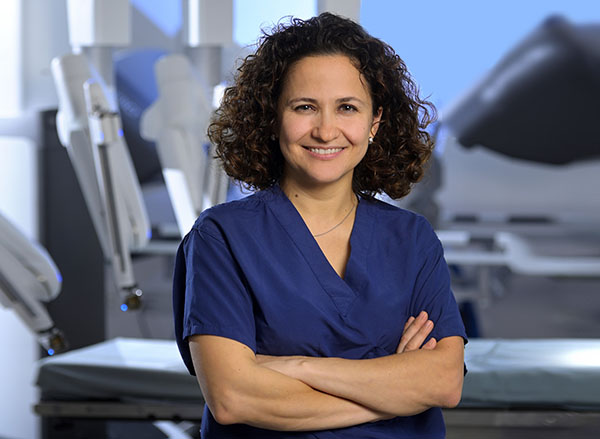
Anna Spivak, DO -- Colon and Rectal Surgeon at Chester County Hospital
The death of actor Chadwick Boseman last summer sent shockwaves through social media. The timing was difficult for many to grasp. He was at the height of his fame, just a couple of years removed from his starring role in the blockbuster film, Black Panther. But it was the cause that made his death even harder to comprehend. Boseman waged a private, four-year battle with colorectal cancer before succumbing to the disease at age 43.
Colon cancer?! Isn’t that something that only older adults are diagnosed with? While it’s true that colorectal cancer, which causes tumors in the colon and rectum, most commonly affects people who are 50 and older, mounting research is showing a steady increase in the number of young people diagnosed with colon and rectal cancer. Last March, the American Cancer Society (ACS) published a report that found the rate of colorectal cancer among people younger than 50 has been increasing by about 2% annually in recent years.
In 2018, the ACS started advising doctors to begin regularly screening for colorectal cancer at age 45, five years younger than what it had been recommending. There remains some disagreement among the authoritative organizations in the field, but many have since also revised their guidelines to reflect the younger screening age. (Those with high-risk factors, such as a diagnosis of inflammatory bowel syndrome or a family history of colorectal cancer, may need to begin their screenings at an even earlier age).
"Colon cancer is unique in that it can be preventable in many patients," says Anna Spivak, DO, a colon and rectal surgeon at Chester County Hospital in West Chester, PA and Penn Surgical Specialists West Chester.
Colon cancer usually begins as small, benign clumps of cells called polyps that form on the inside of the colon. If they remain there long enough, they can become cancerous. But if they’re removed, the threat is gone.
"By lowering the recommended age to begin screening, we’re now able to identify people who otherwise would not have been identified until they developed later-stage colorectal cancer at 50," Dr. Spivak says.
Another Disturbing Colorectal Cancer Trend
To put the issue into perspective, about 90% of the nearly 150,000 new cases of colorectal cancer that will be diagnosed this year will occur in people who are 50 or older. So the shift is still slight. But it’s also one of a few different things concerning health experts about the current state of colorectal cancer in the United States.
Last October, in the same statement in which the US Preventive Services Task Force announced it was recommending that screening start at 45, it also noted that "about a quarter of people ages 50 to 75 have never been screened."
The pandemic has also had a negative impact on all routine screenings. In October, the Colon Cancer Foundation tweeted, "Colorectal cancer screenings have fallen 86% compared to 2017 and 2019 averages."
"We’re seeing an increase in diagnoses, and they’re often diagnoses of later-stage colorectal cancer," Dr. Spivak says. "Many who had their screenings cancelled last March are just now coming in. Which means that we’ve missed the chance to find their colorectal cancer early, when treatment is the most effective."
What You Need to Know about Getting Screened for Colorectal Cancer
As easily prevented as colorectal cancer is, it often is not. In the US, it’s the second-most common cause of cancer deaths. Nearly 53,000 people are expected to die this year from colorectal cancer.
Dr. Spivak says that startling figure underlines the importance of early detection. There are a number of different kinds of colorectal cancer screenings available, though the colonoscopy is considered the “gold standard” because it’s the most accurate of them all. It also can be used to remove any polyps that are found.
Still, the prospect of undergoing a colonoscopy is likely to fill most people with a sense of dread.
"Most don’t know what exactly a colonoscopy entails, but they know it involves a scope going in their anus. So they create this mental barrier and they put it off," Dr. Spivak says. "But you’re under anesthesia during the procedure, so there’s really nothing to be concerned about in terms of physical discomfort."
For those considered at average risk, their first colorectal cancer screening should be done at age 45. The timing of the next one depends on the findings of the first screening, Dr. Spivak says. If no polyps are detected, you shouldn’t need another screening for 10 years. If polyps are detected, you’ll likely need to schedule your next screening in three to five years. If you’re considered at high risk of developing colorectal cancer, you may need to begin getting screened sooner than 45 and more frequently from that point.
Those timelines are relevant, Dr. Spivak says, only if you’re not experiencing symptoms that include, but are not limited to, rectal bleeding; changes in bowel habits, such as constipation; and changes in stool consistency.
"Too often, people are willing to endure bloating or self-diagnose their discomfort as hemorrhoids,” she says. “But these symptoms need to be taken seriously at their onset and examined by a healthcare provider."
If you’re experiencing any of the above, or you’ve never been screened for colorectal cancer and you’re 45 or older or at a higher risk for developing colorectal cancer, you can either schedule an appointment with your family doctor or schedule a colonoscopy with a gastroenterologist or a colon and rectal surgeon, like Dr. Spivak. In either instance, don’t put it off.
"The Bottom Line: Early detection makes all the difference with colorectal cancer," Dr. Spivak says.
Related Information from Chester County Hospital: